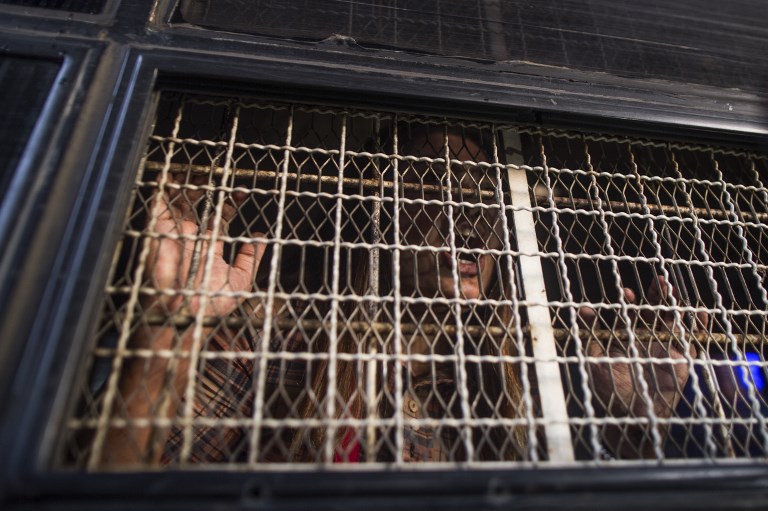The state of free speech in Myanmar has not only failed to improve since Aung San Suu Kyi’s National League of Democracy (NLD) took office in 2016, it has steadily worsened, a Human Rights Watch report released in Yangon this morning asserts.
Dashed Hopes: The Criminalization of Peaceful Expression in Myanmar argues that the NLD-led civilian government has dashed pre-election hopes they would address long-abused “broad and vaguely worded laws” and instead only co-opted them for their own purposes.
At least 43 journalists have been arrested since the NLD assumed power, according to Athan, a local freedom of speech organization quoted in the report.
The most high-profile instance, of course, has been the arrest of Reuters journalists, Wa Lone and Kyaw Soe Oo, who were “entrapped” by plainclothes police for their reporting on an army massacre of 10 Rohingya Muslim men and boys.
Less familiar to some is the case of former Coconuts Yangon photographer Aung Naing Soe, who along with Hla Htin, Singaporean reporter Lau Hon Meng, and Malaysian cameraman Mok Choy Lin, were denied legal representation for 14 days after their arrest for bringing a drone into the country while doing a story for Turkish broadcaster TRT.
“They interrogated me for 11 days — one day about the drone and 10 days about my entire life,” Aung Naing Soe said. “We were held for 14 days with no communication with the outside world.”
Another group of three reporters, Lawi Weng, Aye Nai, and Pyae Phone Aung, were arrested in June 2017 under the Unlawful Associations Act, while attempting to cover a drug-burning ceremony conducted by one of Myanmar’s many ethnic militias.
The overall picture painted is a bleak one in which Myanmar has actually reversed course on many reforms undertaken under the Thein Sein military government — restricting access to information and conflict areas, in particular troubled Rakhine State, and rolling back civil protections against journalists and activists.
“This is a significant change since 2016. There was a lot of momentum and political will from the NLD to do the right thing, and we were optimistic. Since then, the situation has become … much worse after they doubled down on the right to repress,” deputy director of Human Rights Watch’s Asia Division, Phil Robertson told Coconuts Yangon.
Laws considered key to that repression of lawyers, journalists, students, activists include the Telecommunications Law 66(d), Myanmar Penal Code 505(b), Unlawful Associations Act, and the Official Secrets Act.
The Telecommunications Law, with its loose interpretation of defamation, has proven a particularly effective cudgel against government critics.
“66(d) is like a plague that is killing free speech in Myanmar. The situation cannot continue. Failure to reform these laws will have a chilling effect throughout the country. The NLD need to think about 2020 and whether or not they want to be jailing citizens who speak up and protest,” Robertson said.
NLD spokesman Myo Nyunt, however, rejected the idea that his party’s use of existing statutes has been overbroad or repressive, as well as the report’s broader conclusions.
“This is their view, from an international group’s perspective. We don’t accept that freedom of expression has become worse. From our point of view, we respect media freedom and we are working hard,” he said in an interview with Coconuts Yangon.
“We accept that there have been more cases brought against journalists but we have to look at each individual case – some people have written things that are unacceptable, some people have affected another person’s dignity.”
The capricious way in which the government has interpreted “another person’s dignity,” however, has had a trickle-down effect, according to Yin Yadanar Thein, founder of Free Expression Myanmar, who suggested that 66(d)’s abuse is warping citizens’ ideas about free speech.
“The government, instead of stopping the criminalization of speech, is using the courts to complain against human rights activists and critics. Because it has become so well known, now people are using the law also,” she said, describing a proliferation of defamation suits.
“It is affecting ordinary people’s freedom of expression.”





Reader Interactions